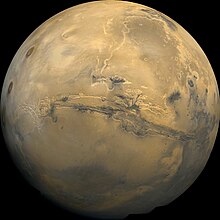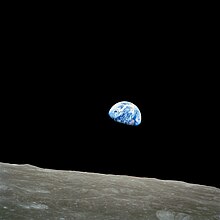Wikipedia:Wikipedia Signpost/2013-01-14/WikiProject report
Reach for the Stars: WikiProject Astronomy








This week, we set off for the final frontier with WikiProject Astronomy. The project was started in August 2006 using the now-defunct WikiProject Space as inspiration. WikiProject Astronomy is home to 101 pieces of Featured material and 148 Good Articles maintained by a band of 186 members. The project maintains a portal, works on an assortment of vital astronomy articles, and provides resources for editors adding or requesting astronomy images. Since the 2010 reorganization of all space-related projects, WikiProject Astronomy has served as one of the primary outlets for space-enthusiasts, alongside WikiProject Spaceflight (interviewed in 2011) and WikiProject Solar System (interviewed in 2008 and 2011). This week's interview includes WikiProject Astronomy members StringTheory11, Keilana, Casliber, and Wer900.
What motivated you to join WikiProject Astronomy? Have you contributed to any of the project's Featured and Good Articles? Do you participate in any of WikiProject Astronomy's subprojects and task forces?
- StringTheory11: Having joined somewhat recently (July 2012), I can clearly remember why I chose to join the project. Originally here on Wikipedia, I worked exclusively on chemical element articles for WikiProject Elements, but around this time, I came across the {{Stars of Cygnus}} template somehow, and noticed that many of the stars were redlinks. I forget the exact order of events after this, but eventually I wound up joining the project and am now working on creating articles for all stars brighter than magnitude 5. Having joined recently, I don't have any GAs or FAs here yet, but I have brought another natural science article, periodic table, to FA and am currently planning to work on Eta Carinae after I finish my current projects. I guess one could consider me to be most active in the astronomical objects project, but I plan to branch out into other areas eventually.
- Keilana: I too joined recently, in April 2012. I joined because I was working on Andromeda (constellation) at the time and was planning to work on more constellation articles. I've contributed to a few constellation FAs (Andromeda, Aries (constellation), Auriga (constellation), and Corona Australis, which were really positive, collaborative experiences. I especially enjoyed helping Casliber, who took the lead on Corona Australis. Though I've been busy with women scientists lately, I hope to continue pushing all of the constellation articles to GA and ultimately, FA.
- Casliber: I've been there off and on over the years- I read a couple of really cool books on Sirius, so I buffed that one up some time ago in early 2008. It remained my one astronomy FA until earlier this year. Betelgeuse in some ways ranks as my most rewarding and fascinating FA to have worked on, I initially worked it up and then Sadalsuud really ramped up the momentum. Titrating the prose between exact but dry and engaging but possibly too wordy was an interesting endeavour. I think astronomy articles can be very tricky to improve to balance the prose, and working on them collaboratively is to be recommended! A lot more sources are online than other stuff I work on (biology), but translating material to common English can be tricky indeed. Many members are only sporadically active so the WikiProject's activity can wax and wane markedly. Running prose by laypeople is extremely helpful and folks not familiar with astronomy are helpful in reviewing at FAC or GAN. I've gotten into constellations as they are relatively light on the hardcore astrophysics which I am not so good at....
The fields of astronomy and spaceflight has been covered by a variety of WikiProjects over the years, prompting the reorganization and merging of astronomy subprojects on several occasions. How is the current assortment of astronomy subprojects faring? What can be done to increase communication and collaboration between all the subprojects?
- Wer900: The number of articles actively edited by WPAST increases and decreases in cycles based on how and when new astronomy-related news is released. Like any scientific field, progress comes in the form of a punctuated equilibrium, proceeding rapidly before settling to a lower base rate, with the cycle repeating itself eternally. Astronomical objects are discovered all the time, but rarely is a discovery of particular note announced that causes a surge in activity, which then dies down after all the required articles have been started and fleshed out to a much slower-paced improvement of articles incorporating new developments in the field. I think that it is the lack of recognition of these surges and declines in activity that keeps WikiProject Astronomy hanging by a thread, even though there are so many already extant articles that can be improved. What can be done to improve this is to consolidate all subprojects and to more actively market the existence of WikiProject Astronomy in order to build a committed team of editors that improves the necessary articles rather than merely working on those articles which are at the moment a "hot topic." This interview will help greatly to revitalize the project.
- Keilana: Though I think the overarching project is doing okay, the subprojects aren't as active. The only one I've been involved in is the Constellations Taskforce, which has effectively been folded into the main project. I agree with Wer900, it may be helpful to the project as a whole to keep the guideline pages and resources compiled by the subprojects but, for example, redirect the talk pages to Wikipedia talk:WikiProject Astronomy.
- Casliber: My feelings align with Keilana's - I think redirecting the talks to the main project talk page is the way to go.
There are 226 astronomy-related articles on Wikipedia's list of vital articles. Have there been any concerted efforts to improve these articles? Why do some vital articles receive greater attention than others?
- StringTheory11: In my time here, no, there have not been any efforts to improve the articles. That doesn't mean that improving the articles is impossible at all; it is very possible for one person or a small group to take a VA to FA level. As for the second part of the question, some topics are much easier to write about than others. For example, it would be much easier to make Neptune an FA (it is already) than it would be to bring something like universe to FA, as Neptune has concrete boundaries around which to write about, while universe is a little more abstract. Do we write about all multiverse theories? How much of the Big Bang do we include? Overall though, I would encourage anyone who is interested to improve the vital articles, as improving them gives the biggest benefit to the reader.
- Keilana: I know that the planet articles are largely FAs, but if I remember correctly, that was done a couple of years ago. There are others, including star, but again, they weren't done during my time with the project. Since I've joined, people have been working on the constellation articles on the vital list, several of which are now FAs or GAs. I'd love to see more coordinated effort on other vital astronomy articles!
- Casliber: Not sure, I have not seen any organised official collaborations on astronomy topics, but they might yield some Good Vital Articles.....
Has the project made any progress creating requested astronomy articles? What are the greatest difficulties editors face when creating or expanding new articles about astronomy-related topics?
- StringTheory11: Progress on these articles is progressing, slowly but surely. Take a look at the list and you will notice a smattering of bluelinks mixed in with the redlinks here. Of course, if a subject does not have an article on Wikipedia yet, it is unlikely to receive much coverage, although this is less noticeable in the science fields. Overall though, I do think that we could be doing better in this area, as there are some requests from 2007 that have still not been answered. As for the other part of the question, I would say that the hardest part of creating these articles is finding sources. As I mentioned earlier, the subject will probably not have much coverage if it doesn't have an article yet, so finding reliable sources relating to the topic in question can be a very hard task.
What are the project's most urgent needs? How can a new editor help today?
- StringTheory11: In my opinion, there are three ultimate goals: create all requested and redlinked articles, improve all mid-importance or higher articles to GA, and bring all top-importance articles to FA. Of course, these are long-term goals and will probably never be complete, but even creating one article or bringing one article from C-class to B-class really helps. Also, there is a constant need for grammar checkers, category fixers, and the like, as there are always small
tyopstypos to fix or missing categories and such. Really, short of adding plain inaccuracies or introducing vandalism, all additions to astronomy articles are helpful and we would appreciate any new editors who do something as small as adding a missing space.
- Wer900: The short-term goals of this project should be an immediate restructuring and decision-making process formalization in order to improve the efficiency of the project. Out-of-date pages should be removed and newer ones should be added and updated, and the old and dormant task forces and subprojects need to be immediately swept away. In the medium term, more publicity of this project should be happening, and the project should be made more cohesive, aggregating the latest astronomy news and sharing articles and journals on a specialized wiki page in order to ease the ability of users to write new articles and improve existing ones even when there are few astronomical discoveries being immediately made. This would greatly improve our coverage of the field of astronomy, ensuring that we leave less undone that we can do. This should all focus on the ultimate long-term goal of expanding and improving articles with all possible information sources, hopefully bringing all of the major user-facing articles to FA and less-major ones to GA, as well as generally improving previously marginalized astronomical articles.
- Keilana: A lot of astronomy articles have tons of unsourced statements and cruft (for lack of a better word) that's been added over the years. Any little bit helps, whether it's fixing the formatting, fixing typos, or adding sources. People with more time to spare could work on getting an astronomy article to GA. There are a lot of freely-available sources, and there's a pretty big pool of willing collaborators.
- Casliber: Getting some more mainpage candidates (i.e. FAs) - Betelgeuse attracted a lot of visitors to the mainpage.
Anything else you'd like to add?
- StringTheory11: If you know anything about astronomy, or even if you don't, please think about contributing to WPAST! We're a really friendly group, and we would love to have you on board :).
- Keilana: I totally agree with StringTheory - it's a really fun project with a lot of work to do! :)
Next week, we'll get tongue-tied by a complicated project. Until then, feel free to conduct a discourse analysis in the archive.



Discuss this story